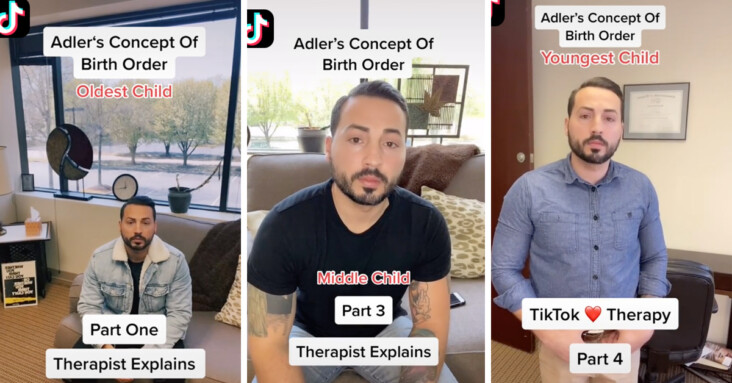Tristan Collazo is a licensed resident in counseling and his TikTok has been going viral due to his videos about psychology and mental health.

He goes by @risethriverepeat on TikTok and started a series in which he explains birth order theory.
Birth order theory was an idea from 20th Century Austrian doctor Alfred Adler and it explains how birth order may affect your personality.
BuzzFeed spoke to Tristan. He explained that Adler’s theory is a dated idea, but also that:
“Research has shown birth order to be one of many components that contribute to the formation of someone’s personality.”
“I gained all of my information from peer-reviewed journal articles on the topic.”
Tristan acknowledges that birth order “is just one component that plays a part in the development of personality.”
The first video tackles the oldest child:
“Families place unrealistic expectations on the eldest child, and because they are no longer the only child, they must adapt to change. In turn, they become perfectionists, people pleasers, and authoritative — yet extremely helpful. They learn to bear most of the responsibility.”
The second child, Tristan explains, “starts off life knowing they have to share the attention of their parents. Their older sibling serves as a role model but also sparks a competitive fire within them. They strive to catch up and surpass their older sibling. In turn, they may be more likely to be better adjusted in life. They are more competitive, peacemakers, people pleasers, rebellious, and always gaining new abilities.”
A middle child may have these traits:
“The middle child deals with significant changes in life and may become resentful and frustrated. It’s not easy to please parents as much when you’re sandwiched between the oldest and the youngest. Middle children in smaller families appear more frustrated, while those in bigger families may be more cooperative to get their needs met. They may feel like life is unfair, feel unloved, or impatient, but they can also feel even-tempered, adaptable, and able to compromise.”
And then the youngest:
“The youngest child does not have the disadvantage of having to compete with a new sibling; they are considered the ‘baby.’ Since their siblings have likely become independent, the youngest may receive more attention. The youngest may be outgoing, an attention-seeker, feel inferior to their other siblings, hyper-dependent on others, more competitive to catch up with their siblings’ developmental level, and may behave as if they’re the only child.”
The comments were largely about how very true all of this was — or at the very least, how relatable everything felt.
“Birth order alone does not determine personality. A variety of factors, including socioeconomic status, parental attitudes, gender roles, and social influences also contribute to the shaping of an individual’s personality,” Tristan told BuzzFeed.
“This concept states that it is not merely the order in which you were born, but the situation in which you were born and the way in which you interpret it. Individuals can identify with more than one birth order category.”
He has since continued the series with explanations of only children, twins, and more!

